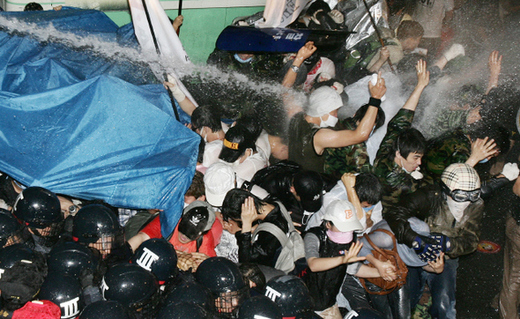Gov’t announces publication of sanitary conditions for US beef
The Hankyoreh | 26 June 2008
Gov’t announces publication of sanitary conditions for U.S. beef
Protests erupt across the country with 100 arrests made, potential for clashes at cold storage warehouses increases

On June 25, Agriculture Minister Chung Woon-chun asked the Ministry of Public Administration and Security to publish sanitary conditions for U.S. beef imports in a government gazette, four days after the South Korean government announced the outcome of additional negotiations with the United States on the resumption of American beef imports. The beef issue is again facing a watershed moment as opposition parties and civic organizations have continued to protest against the government’s move to resume U.S. beef imports, calling it a “declaration of war against the people.”
In a statement titled, “On the occasion of issuing a legal notice of sanitary conditions for U.S. beef imports,” Agriculture Minister Chung said, “I asked the Ministry of Public Administration and Security to issue the legal notice after reflecting on the outcome of the additional negotiations on the sanitary conditions for U.S. beef imports that was set on May 29. New sanitary conditions for imports (of U.S. beef) are expected to come into force on June 26.” The publication of sanitary conditions is the final administrative step for resumption of U.S. beef imports.
In addition to announcing the publication of the gazette, the agriculture ministry unveiled a set of additional terms for the resumption of U.S. beef imports. Only imports beef from U.S. meat-processing plants that comply with an age verification program called Quality System Assessment will be allowed. The government said that the program encourages the plants to voluntarily ship only beef from cattle younger than 30 months old to South Korea.
The ministry also announced that shipments of meat containing brains, eyes, skulls and spinal cords from cattle younger than 30 months of age will be sent back if found during quarantine inspections. In addition, the South Korean government will have the right to monitor U.S. meat-processing plants and inspect U.S. plants when they violate the sanitary rules.
“Private companies from the two nations have signed voluntary agreements to trade U.S. beef from cows younger than 30 months of age until public confidence (in U.S. beef) is restored. To support the implementation of the voluntary agreement, the U.S. government also agreed to create a verification program to certify that beef imports are coming from cattle younger than 30 months,” Chung said.
Later in the day, after the government announcement was made, the People’s Countermeasure Council against Full Resumption of Imports of U.S. Beef Endangered with Mad Cow Disease, an umbrella group of some 1,700 civic groups nationwide, held an emergency press conference. “The publication of sanitary conditions is a declaration of war against the people. The government should withdraw the legal notice and be frank in revealing what happened in the additional negotiations,” Park Won-suk, one of the umbrella group’s chief coordinators, said at the press conference. “If the government goes ahead with publication of the legal notice and ignores the people’s call to hold a public debate, it is apparent that the government will be heading for an explosion in resistance.”
As news of the government announcement spread, protests were held across the country in Seoul, Busan, Incheon, Daejeon and Ulsan. Approximately 20,000 people gathered on Sejong Avenue in central Seoul, while 2,000 people demonstrated in Busan.
At 3:00 p.m., some 50 members of the People’s Countermeasure Council gathered to begin demonstrating in front of the Gyeongbokgung subway station in Seoul. Later, at 7:00 p.m., the group held a candlelight demonstration on Sejong Avenue, during which shouts of “Withdraw the public announcement” and “Out with Lee Myung-bak” could be heard. People trying to approach the Blue House were blocked by police with water canons and fire extinguishers. By dawn, approximately 100 people had been arrested.
Meanwhile, the Korean Confederation of Trade Unions, one of the nation’s two largest umbrella labor groups, said it would “block the release of U.S. beef by deploying more than 100 union members each at cold storage warehouses beginning June 26.” In Busan, KCTU members plan to block the Gamman quay with a demonstration beginning 9:00 a.m. on June 26, raising concerns about a possible clash with police.





